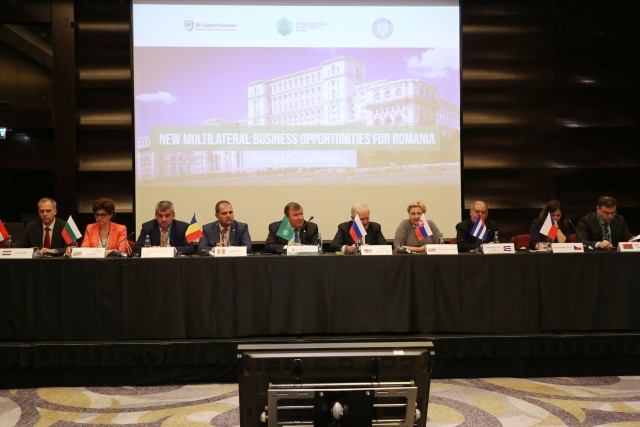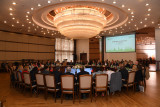The New strategic era: IIB Council adopts Development Strategy until 2023

On June 26-27, 2017, the 107th Meeting of the Council of the International Investment Bank (IIB) took place in the Romanian capital Bucharest, gaining per se a historical significance in the context of the future of the Bank, which activities were relaunched as a result of the comprehensive reform of the year 2012. Its premier outcome is the unanimous approval by the member-states of the IIB’s Development Strategy for the period 2018-2022, which determines the global vector of the multilateral development institution’s growth path not only for the next five years, but its longer-term strategic guides.
The Heads of Delegations highly apprised the quality of the document, which has become the result of close dialogue and cooperation of the Bank's management with the Delegations of the member states, as well as with the World Bank’s consultants. Following the common opinion, the presented Strategy not only meets the actual needs of the members, but also soundly designed to provide for the further development of the IIB in the new geo-political and geo-economic realities.
The next strategic cycle is aimed at enhancing the role of the IIB as an effective multilateral financial institution, which operates in the interests of sustainable development of the economies of its shareholders. That is why the Bank's updated mission is defined as "facilitating connectivity and integration between the economies of the Bank’s member states in order to ensure sustainable and inclusive growth, competitiveness of national economies, backed by the existing historical ties.”
The implementation of the so called “Bucharest Strategy” shall provide for a two-fold growth of assets and of the loan portfolio on a five-year horizon, further qualitative improvement of customer relations, development of flexible product and service offerings in each of its member states, achievement of a greater level of financial stability and institutional maturity, in particular by transition to a three-tier corporate management system. Strategic priorities also include: expansion of the Bank’s mandate through financing export-import transactions, providing direct financing and bank guarantees, as well as trade finance and money market instruments, participation in and organization of syndications.
Among the prospective business and functional areas are: equity investments, participation in funds, provision of technical assistance and advisory services, gradual expansion of the operations’ geography and of the funding base, including by way of potential increase in the number of the Bank’s shareholders and participants with a special status. At the same time, the Bank will strive to continuously improve its operational model with the focus on the development of partnerships, credit process, risk management, compliance and internal control, as well as a motivation system.
"The general line for the further development of the IIB is not just to preserve its achievements, but to multiply the effect for national economies in the new realities by firmly gaining the role of a Bank-Integrator, which acts in the interests of all member-states and every single one of them. This is also one of the key distinctive features of the new Strategy - a most precise definition of value-added for each of the countries with greater business orientation of the Bank's activities. The value proposition will be detailed in individual country strategies, which the shareholders instructed us to draft before the end of the year," - commented the Chairman of the IIB Board, Nikolay Kosov.
“The Bucharest Summit” gained yet another momentum by having for the first time ever a sovereign state, the Republic of Belarus, as a participant in the Open session in the capacity of the IIB’s Observer. This status was granted to the country in March 2017. For several years, the IIB has been successfully implementing the trade finance programme, a significant volume of which accounts for Belarusian counterparties, financial and banking institutions.
The Council Meeting also saw the presentation the IIB Public Annual Report for 2016, the first ever in the newest history of the institution, which was highly praised by the Delegations.
On June 27, 2017, within the course of the Open Session of the Council, the Heads of the Delegations as well as Mr. Taras Nadolniy, Deputy Chairman the National Bank of Belarus, along with other observers of the IIB made their statements; a number of documents were signed, including the Multilateral Memorandum on Cooperation between the IIB and the Chambers of Commerce and Industry of the member-states, as well as a number of credit and guarantee agreements.
The programme of public events was followed by the International Business Forum that brought together about 150 representatives of businesses, governments, commercial banks and IFIs such as AIIB, IFC, EBRD, BSTDB, EDB, EIF, EIB, as well as entrepreneurs and experts from Romania and other countries.
Since the Meeting of the Council took place in the capital of Romania - the state with one of the largest loan portfolio of the IIB, the event was co-organized with the Ministry of Public Finance of Romania and BT Capital Partners and was held under the general theme of "New Multilateral Business Opportunities for Romania".
During three sessions participants discussed the development prospects of the Romanian economy and the stock market, the growth of investment activity in the country and in the region of the Central and Eastern Europe in general, the potential of «green» financing as an effective tool for IFIs’ cooperation, as well as the possibility of expanding trade finance and exporting-import operations with the participation of the IIB’s member states.
On the sidelines of the events, there were a number of bilateral meetings held between the Chairman of the IIB Board, Nikolay Kosov, and the senior executives of the Ministry of Public Finance, the Ministry of Foreign Affairs of Romania and a number of leading local companies and financial organizations. The common keynote of those was a mutual interest to find specific steps for further increase of the Bank's operational activity on the Romanian track.


